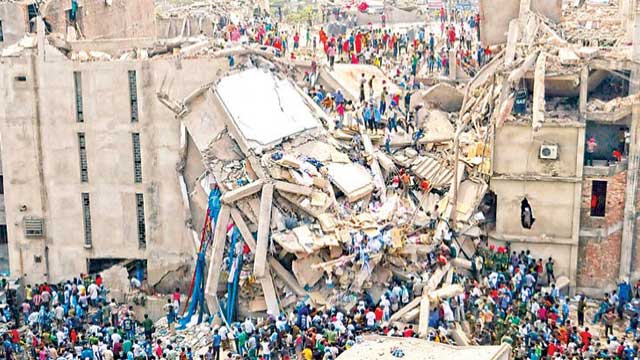The victims of the world’s worst industrial disaster are still waiting for justice as deposition in a homicide case did not begin in last seven years of the tragic incident that killed at least 1,138 workers.
No hearing was held the case in more than one year and none of the 594 prosecution witnesses was examined in last four years, officials said.
Charges were framed against 41 people, including owners of five factories, local government representatives, administration officers and political activists, on July 18, 2016 in the homicide case after the collapse of Rana Plaza building that housed five readymade garment factories at Savar in Dhaka on April 24, 2013.
Victims, labour leaders and rights activists vented their grievances over the apparent standstill of the trial proceeding.
They blamed the government’s lack of willingness for the unusual delay of the trial.
Lawyers said that there was no progress in 14 cases, including 11 cases filed by the Department of Inspection of Factories and Establishments with the Labour Court, filed over the Rana Plaza building collapse at also injured more than 2500 workers making many of them permanently handicapped.
Sohel Rana, local Awami Juba League leader at Savar, his parents Abdul Khaleque and Marzina Begum and five factory owners were named in cases pending with the District and Sessions Judge’s Court for several revision cases which were filed challenging the cases.
Of the 41 accused, only Sohel Rana is in custody while 32 are on bail and six are still in hiding and two have died in the meantime.
Dhaka district court public prosecutor Khondoker Abdul Mannan on Thursday told New Age that no deposition was taken as the High Court had stayed the proceedings after several revision cases challenging the order for framing charges were filed.
He said that the High Court on different dates stayed proceedings against eight accused in Rana Plaza cases: former Savar municipal mayor Refatullah and former councillor Mohammad Ali, Abul Hossain, Shahidul Islam, Yusuf Ali, Abdus Samad, Jamsedur Rahman and Belayet Hossain.
Refatullah and Mohammad Ali got the proceeding stayed on May 9, 2018 and December 12, 2018 while the rest stay orders had already been withdrawn, the prosecutor said.
He said that the attorney general had been requested to take steps to get the stay order withdrawn to pave the way for the trial.
Attorney general Mahbubey Alam, however, said that the public prosecutors did not inform him about the stay orders.
‘If the PP persuades me, I will try to vacate the barriers,’ he said.
Bangladesh Shrama Institute trustee board chairman Shah Atiul Islam said that the failure in ensuring justice for the victims of the worst industrial disaster in the country had become a ‘national disgrace’.
Bangladesh Garment Workers’ Solidarity president Taslima Akhter at an online press conference placed seven-point demand, including speedy trial of the accused and their exemplary punishment, declaration of April 24 as a morning day and holiday for garment workers.
Workplace safety for workers came forward and the brands and buyers were forced to contribute in Rana Plaza Claim Administration after the disaster.
Garment Shramik Karmachari Oikkya Parishad in a statement demanded amendment to labour law to install compensation on the basis of the loss of earnings of a worker.
Victims Mahmudul Hasan Ridoy, Nasir, Nilufa, Pakhi and Roksana urged the government to ensure exemplary punishment of the accused, who brought untold sufferings for them.
Bangladesh is the second highest RMG exporter in the global market and the major export destinations are the US, the UK, Germany, Belgium, Denmark, France, Italy, the Netherlands, Poland, Spain and Canada.
More than four million workers, mostly female, work for at least 4,000 garment factories located at several industrial belts across Bangladesh.





